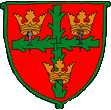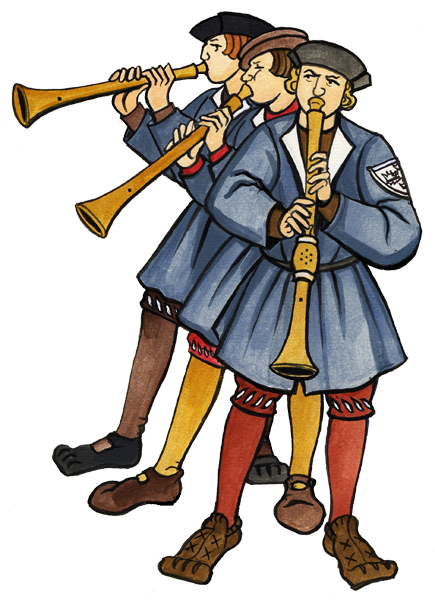


HOME
COMMENTS
QUOTES
INSTRUMENTS
CD
DIARY
MUSIC
PICTURES
LINKS
CONTACT

picture © Antony Barton
"Of all musical sounds that from day to day smote the ears of a sixteenth-century town resident, the deafening skirl of the shawm band in palace courtyard or market square must have been the most familiar."
Anthony Baines
The publick waites who liveryes do own,
And badges of a City, or some Town,
Who are retaind in constant Yearly pay,
Do at their solemn publick meetings play.
And up and down the Streets, and Town in cold
Dark nights, when thInstruments they can scarce hold
They play about, and tell what hour it is,
And weather too, this Course they do not miss,
Most part of Winter, in the Nights; and when
Some generous Persons come to Town, these Men
As soon as theyre Informd, do then repair
Unto their Lodgings play them some fine Ayre
Or brisk new tune, such as themselves think fit,
And which they hope, with th Gallants fancies hit,
They cry God Bless you Sirs; again then play,
Expecting Money, eer they go away.
Pecunia obediunt omnia. Anon. c.1680
If a piper youd live to be
Learn you well your diridiridee
Which belongs to the notes small,
Lest you look a fool before all.
Agricola 1528
"The entrayles which undernethe the myddreffe, be exercysed by blowynge, eyther by constraynte, or playenge on the Shaulmes, or Sackbottes, or other lyke instrumentes whyche doo requyre moche wynde."
Sir Thomas Elyot, The Castel of Helth 1534
"These days the loud shawms and trumpets have driven the sober fiddles away from the festivities and the young girls dance like mad to the noise, womanishly and tastelessly wobbling their bottoms like cows."
Konrad von Megenberg, ca. 1350
Capriole: Truly shawms greatly resemble trumpets and sound quite nice when the large ones, sounding an octave lower, are combined with the little ones which sound higher.
Arbeau: These two are excellent for making a loud noise together, at fairs and large assemblies, but if you play them with the flutes (and recorders etc.) they will be drowned out. It works well with a tabor or large drum though.
Capriole: Can the drum be used for recreational dances?
Arbeau: Yes, certainly with the shawms, which are noisy and screeching and are blown forcefully.
Capriole: Let us return to the question of the (pipe and) tabor and the dance.
Arbeau: The tabor, played together with the long flute amongst other instruments, was employed in our fathers' time because a single musician could play them together in complete accord, avoiding the expense of having many players, such as violists and the like. Nowadays, the meanest workman must have shawms and sackbuts at his wedding, when many kinds of recreational dances are performed.
From Arbeau's Orchesography of 1588
Passing the gate, Wifflers (such Officers as were appointed by the Mayor) to make me way through the throng of the people, which prest so mightily upon me: with great labour I got thorow that narrow preaze into the open market place. Where on the crosse, ready prepared, stood the Citty Waytes, which not a little refreshed my weariness with towling thorow so narrow a lane, as the people left me: such Waytes (under Benedicite be it spoken) fewe Citties in our Realme have the like, none better. Who besides their excellency in wind instruments, their rare cunning on the Vyoll, and Violin: theyr voices be admirable, everie one of them able to serve in any Cathedrall Church in Christendome for Quiristers."
Will Kemp Nine Daies Wonder, 1600
We blundered on in pursuit of our night's felicity, but scarce had walked the length of a horse's tether, ere we heard a noise so dreadful and surprising that we thought the Devil was riding on hunting through the City, with a pack of deep-mouthed hell-hounds, to catch a brace of tallymen [note 1] for breakfast. At last bolted out from the corner of a street, with an ignis fatuus dancing before them, a parcel of strange hobgoblins covered with long frieze rugs and blankets, hooped round with leather girdles from their cruppers to their shoulders, and their noddles buttoned up into caps of martial figure, like a knight errant at tilt and tournament with his wooden head locked in an iron helmet. One was armed, as I thought, with a lusty faggot-bat, and the rest with strange wooden weapons in their hands in the shape of clyster-pipes, but as long, almost, as speaking-trumpets. Of a sudden they clapped them to their mouths and made such a frightful yelling that I thought the world had been dissolving and the terrible sound of the last trumpet to be within an inch of my ears.
Under these amazing apprehensions I asked my friend what was the meaning of this infernal outcry. 'Prithee,' says he, 'what's the matter with thee? Thou look'st as if thou wert galleyed. Why these are the city waits, who play every winter's night through the streets to rouse each lazy drone to family duty.' 'Lord bless me!' said I. 'I am very glad it's no worse. I was never so scared since I popped out of the parsley-bed. Prithee, let us make haste out of the hearing of them, or I shall be forced to make a close-stool pan of my breeches.' At which my friend laughed at me. 'Why, what' says be, 'don't you love music? These are the topping tooters of the town, and have gowns, silver chains, and salaries, for playing "Lilliburlero" to my Lord Mayor's horse through the city.' 'Marry,' said I, 'if his horse liked their music no better than I do, he would soon fling his rider for hiring such bugbears to affront His Ambleship. For my part when you told me they were waits, I thought they had been the Polanders and was never so afraid but that their bears had been dancing behind them.'
Notes:
1. 'tallymen': Ward and other contemporary writers can find no words strong enough to express their hatred of the tallyman or itinerant vendor of goods on the instalment plan.
2. 'galleyed': Condemned to the galleys.
Ned Ward, The London Spy 1709.